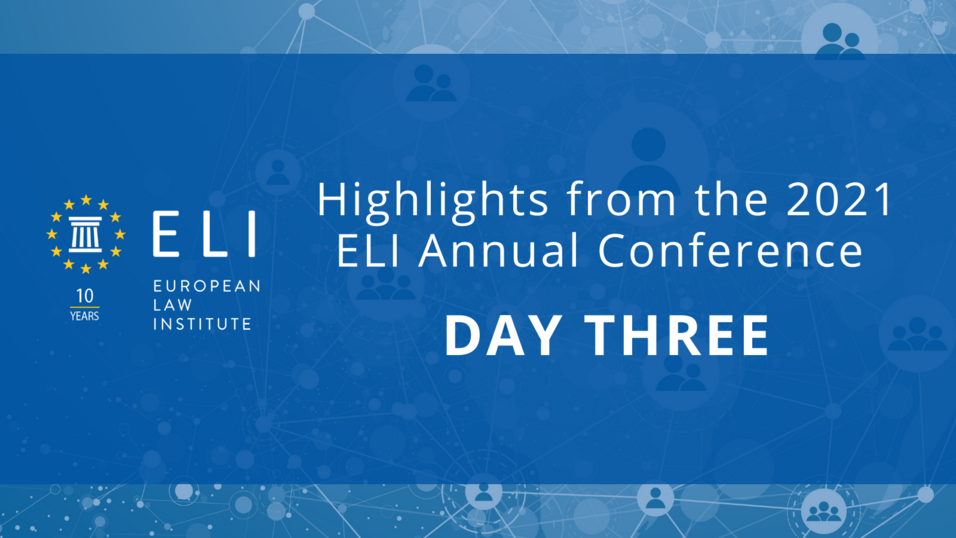The third day of ELI’s conference was opened with a panel on Corporate Sustainability, Financial Accounting and Share Capital. Corrado Malberti (Chair; Project Co-Reporter; Associate Professor of Commercial Law at the University of Trento) introduced the eponymous ELI project. Yuri Biondi (Project Co-Reporter, Senior Tenured Research Fellow of the National Centre for Scientific Research of France) presented the preliminary findings of this ELI project, including an assessment of EU policy inconsistencies in the field. Hideki Kanda (Emeritus Professor at the University of Tokyo and Professor at Gakushuin University Law School) provided his views on the project from a Japanese perspective with a focus on both corporate and accounting law. He was followed by Martina Macpherson (Head of Environmental, Social & Governance (ESG) Strategy and an Executive Committee Member for ODDO BHF Asset Management & Private Equity), who spoke about the EU Sustainable Finance Disclosure Regulation (SFDR) and investor implications. The session was closed by Colin Haslam (Project Co-Reporter; Professor of Accounting and Finance at Queen Mary University of London) who responded to the presentations of Kanda and Macpherson and emphasised that the ELI project engages with the shift away from the European political project on capital market efficiency and harmonisation of capital markets, towards a broader agenda around sustainability.
The next panel was devoted to Ecocide, an upcoming ELI project. The Team aims to draft a model law for the criminalisation of ecocide in the European Union. Project Co-Reporters Robert Bray (former Head of Unit of the Secretariat of the Legal Affairs Committee) and Fausto Pocar (Professor Emeritus of International Law at the University of Milan) were joined by Jojo Mehta (Co-Founder of Stop Ecocide), Kate Mackintosh (Executive Director of Promise Institute at UCLA) and Marie Toussaint (Substitute in the Committee on the Environment, Public Health and Food Safety). The webinar featured a presentation of the work of the upcoming ELI project as well as current efforts in the European Union to make ecocide an international crime. The aims of the ELI project were also discussed in the context of the work of the Sands group.
During the webinar on the ELI-Mount Scopus European Standards of Judicial Independence, Fryderyk Zoll (Chair; Project Co-Reporter; Professor at the Jagiellonian University in Kraków and the University of Osnabrück) emphasised that the issue of judicial independence is pivotal and is of relevance for the future of Europe. Sophie Turenne (Project Co-Reporter; Lecturer in Law and Fellow in Law at the University of Cambridge, Murray Edwards College) gave a presentation on the ELI project, which aims to promote common standards of judicial independence, in particular across the EU. Silvana Sciarra (Judge at the Italian Constitutional Court), Kathleen Gutman (Référendaire (Legal Secretary) at the Court of Justice of the European Union (CJEU)) and Ksenija Turković (Judge and Vice-President of the European Court of Human Rights (ECtHR)) provided reflections on the work of the ELI project, considering, among other things, the need to define the notion of ‘standards’, possible synergies with other work in the field and recent case-law developments of the CJEU and ECtHR.
The current ELI project on Fundamental Constitutional Principles was also presented. The Chair John Lord Thomas (former Lord Chief Justice of England and Wales) opened the discussion by emhasising the practical importance of the subject matter. The Project Co-Reporters Elise Muir (Professor of EU Law at KU Leuven) and Takis Tridimas (Chair of European Law at the Dickson Poon School of Law, King’s College London and Director of the Centre of European Law) elaborated on the project’s aims, methodology, principles the Project Team has already identified as well as the challenges it faces. They were joined by constitutional law experts Renáta Uitz (Professor of Comparative Constitution Law at Central European University) and Adam Bodnar (Professor, former Commissioner for Human Rights of the Republic of Poland) who commented on the draft report. Speakers addressed, among other things, the trend of an erosion of certain constitutional principles across Europe, which is being counterbalanced by the activities of the European institutions, and the pressing need to protect basic values of liberal democracy.
The last panel of this year’s ELI Annual Conference was devoted to the Concept of Corporate Criminal Liability. Celina Nowak (Chair; Director of the Institute of Law Studies of the Polish Academy of Sciences; Professor at Kozminski University), one of the project proposers, began by explaining the aims of the project, with a focus on general issues and attribution of liability. This was followed by Fabio Nicolicchia (Researcher in Criminal Procedure at the University of Ferrara; practicing criminal lawyer), project co-proposer, who spoke about sanctioning policies and procedural issues in corporate criminal liability. Peter Csonka (Head of General Criminal Law in DG Justice, European Commission) provided an overview of recent developments in this field at EU level. Marc Engelhart (Adjunct Professor of Criminal Law, Faculty of Law at the Goethe University in Frankfurt am Main; researcher at the Max Planck Institute for the Study of Crime, Security and Law in Freiburg) explained the construct of corporate criminal liability and preventive measures in the German legal framework. The last presentation was by Willem Geelhoed (Associate Professor of Criminal Law and Criminal Procedure, University of Groningen), who discussed how to accept corporations as true subjects of criminal law.
In the evening, the ELI Membership meeting resumed for the announcement of the ELI Council election results and the handover of the ELI Presidency.
Webinar recordings from the third day are available below.

